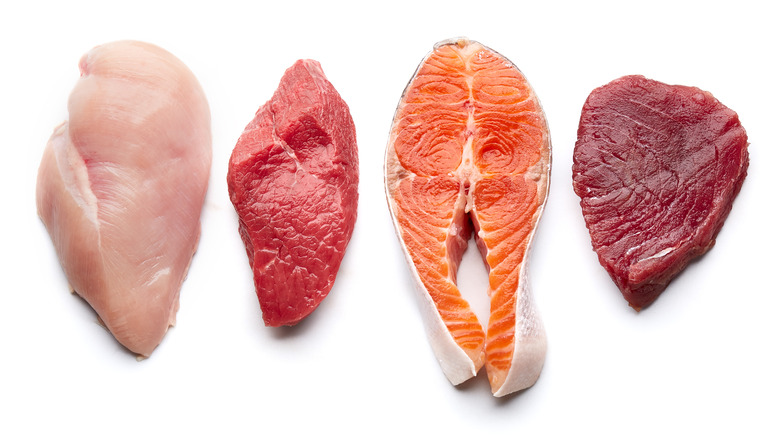Why The Keto Diet May Actually Be Bad For Your Bones
It seems like the keto diet is everywhere you look these days. Often used as a way to lose weight, it focuses on eating lots of fat and very few carbs, according to the Harvard Medical School. However, experts have been raising red flags about the fad diet for years, and even your bone health might be at risk if you start following a keto plan.
The ketogenic diet, called keto for short, works by forcing your body to use fat for fuel rather than glucose, or sugar (via Harvard Medical School). By severely limiting your intake of carbohydrates, your liver has to use stored fat to produce ketone bodies, which can lead to a state of ketosis. Since fat burns more slowly than carbs, it's thought that as you burn fat, your appetite might also decrease, resulting in weight loss. Followers of the keto diet need to fill up on fats at each meal while limiting carbs to 20-50 grams per day and limiting protein as well — high amounts of protein can be converted into glucose (via Healthline).
Beyond the fad, the ketogenic diet is actually predominantly used to manage epileptic seizures in children, and while it's been studied in the short term, even these studies have shown mixed results (via Harvard Medical School).
How the keto diet can affect your bone health
Research has shown that the keto diet comes with risks. In fact, a 2021 review of 120 studies published in Frontiers in Nutrition found that the diet is particularly unsafe, citing concerns of kidney stones, high cholesterol, and increased risk for conditions like type 2 diabetes and Alzheimer's disease. A 2020 study published in Frontiers in Endocrinology also found that following a keto diet for even just a few weeks could harm your bone health (via Everyday Health).
Researchers studied 30 runners who were put on either a ketogenic diet or a high-carb diet for three-and-a-half weeks, testing their blood before and after. They found that those who followed the keto diet showed decreased bone metabolism and formation, as well as increased bone breakdown. Not only that, but even when carbohydrates were re-introduced to this group, markers of bone formation and metabolism still didn't return to normal (although the marker of bone breakdown did return).
The authors of the study emphasized that since bone health is important later in life, more studies need to be conducted on the connection between the keto diet and bone health. In the meantime, it's probably best to be cautious of any diet that's restrictive and focus on finding balance.


